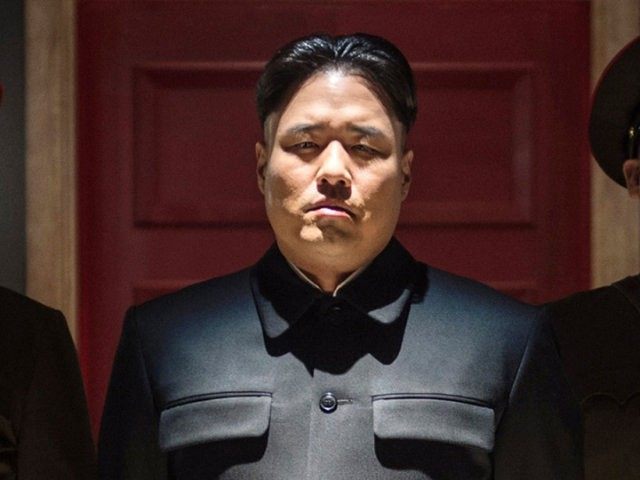With Sony’s decision to pull the Seth Rogen/James Franco starrer The Interview from circulation following a brutal hack attack by the North Korean regime, Hollywood finds its list of acceptable villains growing shorter and shorter. Not only did Sony pull The Interview thanks to intimidation at the hands of Kim Jung Un – the film was about reporters trying to kill the evil dictator – they also pulled a slated Steve Carrell movie, Pyongyang, about the regime.
Ironically, North Korea had become Hollywood’s safest go-to villain, supposedly avoiding the multicultural blowback of targeting Muslim terrorists or the Chinese government—which provides an enormous amount of funding to Hollywood, as well as a lucrative foreign market.
China, in particular, has gotten off easy in terms of Hollywood villainhood—an enormous regime that routinely works with major corporations, forces women into abortions, and jails dissidents makes for an inviting target. Unless, that is, that regime hosts the world’s fastest-growing film market and owns equity in major studios like Legendary Pictures and MGM. China explicitly bans films that “distort the civilization and history of China or other nations… or… tarnish the image of revolutionary leaders, heroes, important historic characters, members of the armed forces, police, and judicial bodies.”
It is no wonder, then, that MGM shifted the villains of its remake of Red Dawn from the Chinese—plausible invaders of the United States, if any are to be found to replace the Soviet Union—to the ridiculously implausible North Koreans. North Korea was a safe target; China was not. As the Los Angeles Times reported at the time, “China has become such an important market for US entertainment companies that one studio has taken the extraordinary step of digitally altering a film to excise bad guys from the Communist nation lest the leadership in Beijing be offended.”
So Chinese villains were off the table. So, too, are Muslim terrorists, given the multicultural backlash to accurate portrayal of Muslim terrorism. When 24 had the temerity to suggest that Muslim terrorists might provide a greater terror risk to the United States than, say, white Europeans, the Council on American-Islamic Relations made such a stink that star Kiefer Sutherland had to disown the Muslim terrorist storyline in a public service announcement for the show:
Now while terrorism is obviously one of the most critical challenges facing our nation and the world, it is important to recognize that the American Muslim community stands firmly beside their fellow Americans in denouncing and resisting all forms of terrorism. So in watching 24, please, bear that in mind.
We’ve also seen the US government get involved to the extent that when an American ambassador is murdered at an embassy in Benghazi, Libya, the Obama administration responds by pushing for the arrest of a bad filmmaker who had the temerity to label Mohammed a villain. Even when Muslim terrorists are featured on film, they’re portrayed sympathetically, as in The Kingdom (2007), where they are equated with American trackers; Rendition (2007), where America’s anti-terror techniques are seen as the catalyst for Muslim terrorism; and The Green Zone (2010), where American greed for oil leads to terror. Going all the way back to 2002, the Ben Affleck bomb The Sum of All Fears, based on the Tom Clancy novel, changed the villains from Palestinian terrorists launching a nuclear attack (plausible) to neo-Nazis doing so (not).
That basically left North Koreans as the only permissible non-white villains on the table.
So much for that. One hack attack, and Kim Jung Un suddenly gets wiped from the film industry.
Now that North Korea has taken its name off the Hollywood permissible villains list—a list that is limited to countries or groups that will not threaten to burn down your theaters or leak your nasty emails—the only folks left are the Russians, the Nazis (and even then, Hollywood prefers that splinter groups too evil for the actual Nazis be targeted, as in Captain America), and white Republican businessmen. Christians don’t riot and murder women in the street when you mock Scripture (This Is The End, starring Rogen and Franco, mocked it relentlessly), and neither do those big bad conservative oil men (no hack attacks after Tex Richman tried to knock down the Muppet theater in The Muppets). And the Russians will likely hack someone to take their name off the hit list sometime soon.
So it turns out that the only villains in Hollywood are non-villains—the sort of folk you don’t really have to fear. Which means that while Hollywood trains us to fight the kind of people we shouldn’t really worry about (oh, no, the Big Bad Christian Voodoo Man wants to stop the transgender kid from following his dream of dancing at the 1910 World’s Fair!), the people we should worry about sit back and chuckle.
Ben Shapiro is Senior Editor-At-Large of Breitbart News and author of the new book, The People vs. Barack Obama: The Criminal Case Against The Obama Administration (Threshold Editions, June 10, 2014). He is also Editor-in-Chief of TruthRevolt.org. Follow Ben Shapiro on Twitter @benshapiro.

COMMENTS
Please let us know if you're having issues with commenting.